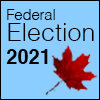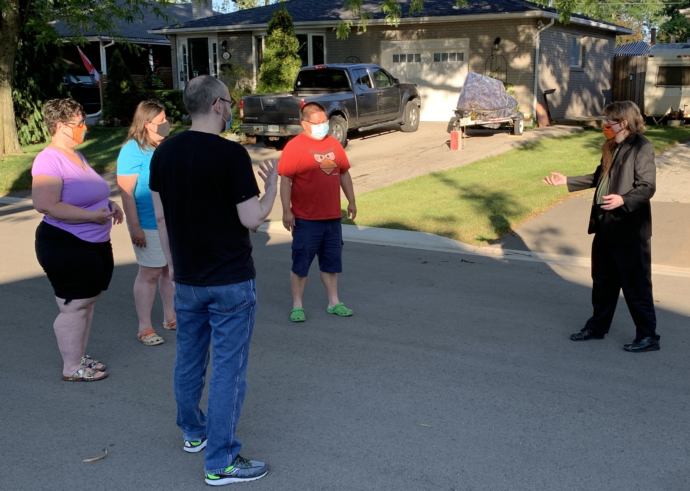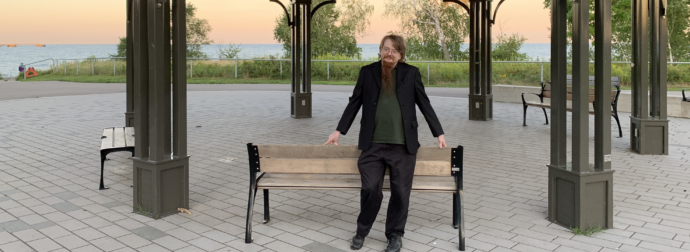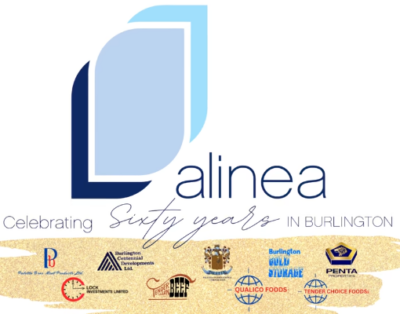 By Ryan O’Dowd: Local Journalism Initiative Reporter
By Ryan O’Dowd: Local Journalism Initiative Reporter
April 18th, 2021
BURLINGTON, ON
Burlington NDP federal candidate, Nick Page, championed universal basic income(UBI) as the most impactful solution to Canada’s wealth gap in his interview with the Gazette. Page’s campaign will focus on a more equitable society for all members, he discussed building back a better Canada post-COVID-19, UBI’s role in combating poverty as well as how it benefits the economy, expanding healthcare, as well as electoral reform and how it may be the path to meaningful climate change action.

NDP candidate Nick Page wants Canadians focusing on re-thinking social security to avoid continued difficult economic times in the face of COVID-19 and whatever else the future holds.
Page began with his vision for a post-pandemic Canada, focusing on re-thinking social security to avoid continued difficult economic times in the face of COVID-19 and whatever else the future holds.
“So the big thing for me, for building back better, is finding a way to make sure that everyone has access to the resources they need to have, food and shelter, without needing to worry about having a job that might go away to the pandemic or automation or to whatever is coming in the future. I am very interested in seeing a universal basic income of some kind implemented so that no matter what happens, everyone at least has the safety net they need to survive no matter what the outcome is,” said Page.
As of today, UBI is not on the NDP official party plan, instead what the party proposes is to “build toward” guaranteed livable income, which is not only less committal but also describes a different system.
A guaranteed liveable income establishes a baseline of earnings deemed “liveable,” if someone is not meeting that baseline their income will be supplemented, this process would essentially expand on existing social safety nets. UBI is much more comprehensive, as Page explains, and aims to cycle the money distributed to all citizens through the economy, theoretically helping not just those below the poverty line but small businesses as well.
“UBI should be just a flat amount of money for everyone regardless of how much money you make. So it’s really simple, you don’t have to worry about jumping through hoops to apply. It’s a really difficult thing to get on social support in this country, and just having it be easy and simple would save a lot of bureaucracy and make people’s lives better.
“So the great thing is when everyone has access to the money to buy food and shelter and to spend a little bit on extras like maybe going to a movie once a year, kind of thing, you’re just spending that money. It’s money that’s going from the government to people, to businesses and it’s circling. It’s taking money that is sometimes just spent sitting in offshore bank accounts from the really rich and the corporation’s and just getting it moving, it lets small businesses benefit because there are more people in the community to spend money on small businesses, instead of having to go through Amazon,” said Page.

Nick Page talking with supporters – social distance and masks.
As for how Canada would afford such measures, Page alluded to taxing the super-rich which the NDP official party platform identifies for their current agenda, without UBI, as a one-per-cent wealth tax applied to all households with assets exceeding $10 million.
Page discussed the importance of expanding our healthcare system to cover such areas as dental, optometric, and pharmaceutical. Tying benefits to employment in the current system “screws” the lower class, said Page.
“Right now you can go to the dentist if you have a good job but if you don’t have a good job you neither have dental coverage or the money to pay the dentist, so you’re screwed. If you don’t have a good job, you don’t have optometry coverage in Ontario. And so by decoupling those from jobs, from having a good job, you help everyone out. You also help the businesses not have to pay for insurance employees like that, which is a big expense for some companies like smaller companies who still need to pay benefits to their employees. That’s a cost they don’t need to have, they only really have it because the government doesn’t come through. And it’s interesting because that came about from wage tax in the US back in World War Two. It was a way to get around wage taxes by giving people more benefits, and then it just kind of became how we do things,” said Page.
One of Justin Trudeau’s most often maligned broken election promises was his vow that the 2015 election would be the last under the first past the post system. Page puts forward a case for a proportional representation system which would lead to federal representation more accurately reflecting the popular vote. Page also alludes to the use of ranked ballots which would theoretically diminish so-called “strategic voting,” particularly in conjunction with proportional representation. You would rank the candidates in order of preference so you don’t need to be dictated by who can win, and your vote would be more meaningfully represented in government.
“You have some of the people who are elected to government assigned to specific districts, and some of the people elected to government are assigned from a party list. And you do the normal voting in a district, probably with ranked voting to figure out who represents that district. And then you use the country-wide proportional ballots. So if, for example, the Green Party gets 8% across the country, it doesn’t all have to be focused on their one riding in Vancouver, or Victoria river is exactly to get a seat, they could have 8% votes across the country, and they’d get 8% of the seats, we would bump them up off their party list, and that way that 8% of people in our country would actually be listened to, they have a voice in government, as opposed to right now, where if after the 2015 election Trudeau only had, votes from like 38% of people, but he got to make all of the decisions because of how first past the post, but he should have had to work with people to make decisions after 2015,” said Page.
Page noted proportional representation may be the best opportunity to implement a government to deal with climate change.
“I don’t think any party with a majority would do what needs to be done to deal with climate change so I think proportional representation or some sort of voting change is what it’s going to take to get the environment under control,” said Page.

Standing in the Gazebo at Spencer Smith Park is photo op at its best.
In the 2019 federal election, the Green Party received 6.6% of the popular vote and scored 3 seats out of 337, based on the methodology outlined in the 2016 report of the House of Commons Special Committee on Electoral Reform under a proportional representation system the Green Party would have scored 22 seats from the same percentage of the popular vote.
If we accept more Green Party seats at the table correlates to more climate change action then Page’s correlation between electoral reform and environmental action may have merit.
NDP candidate Nick Page has a Math degree in Computer Science and Combinatorics & Optimization from the University of Waterloo, Nick has worked in data analysis, online content creation on Twitch, and is now doing tech consulting in the board game design industry.
There are no campaign events scheduled as of today for the Burlington NDP candidate but the Gazette will monitor this as it proceeds.


















As a senior with no medical insurance, this year alone has cost me over $700 in dental/denture costs due to not being able to get regular exams due to covid. . Once the optometrists reinstate their services I will get a free eye exam but my new glasses will require a further $400. By the time I have paid off the credit card bill for these it will be time to start again. These costs take away from our pensions money that could be used for rent, food etc……we have paid into the health system for the last 50 years, we should be able to expect something back that won’t put us into constant debt.
Michael, like you I have no medical insurance. I have been a recipient of CPP Disability Pension for almost 20 years which includes no extended health. Even after 20 years my income is still less than Ontario Disability Pension. Feel blessed your costs are as low as they are. I am not yet 50, and medications and severe dry mouth symptoms are damaging my teeth, and I spent about $1200 on new glasses although I did get the progressive bifocals. My teeth this year cost over $2000. New dentist, cleaning and 8 new surface cavities. I can see my Optometrist covered by OHIP due to diabetes, there are other medical considerations for free or OHIP covered visits, such as medications side effects, medical conditions. Prior to the diabetes diagnosis I was covered by OHIP every 2nd year because one of my medications had a side effect of glaucoma.
I use Ontario’s Trillium Drug Benefits program for the 10 different prescriptions I take daily. The yearly deductible is manageable. I’ve suggested it to government before but an Ontario Trillium Extended Health Benefits Program would be ever so helpful and a way for the Feds to administer universal health care services to those who actually need them.
There’s more to this equation than just a job. There are lots of low paying zero benefits part time jobs. Large companies are exploiting workers by not offering full time positions and Small companies can’t afford to pay benefits. Look at the bigger picture. Government has to step in because business is stepping out. I’m continually appalled to see the qualifications needed for skilled jobs outpace the salaries. The system is out of balance and needs to be corrected. The current system supports corporate welfare but not a livable wage. Do you see the difference? The money never trickles down like they say it will.
” It’s a really difficult thing to get on social support in this country, and just having it be easy and simple would save a lot of bureaucracy and make people’s lives better. ” A lot of business’ are suffering for lack of unskilled labour. It is pretty easy right now to get a job. Shouldn’t the system by structured to get people off social programs, and into the workforce? Of course, making people get jobs, not popular at election time.
Pay employees a living wage and hire them for full time hours and maybe they will want to go back. I don’t feel bad for minimum wage, part time employers who can’t seem to find staff.
Now when the pandemic is not the only thing in the world – it is extremely difficult to get on social support in this country. It took me months to get disability – when I tried to call to understand why my request was denied they told me the department *HAD NO PHONES*, and I would just have to resubmit.
It’d be great to get people off social programs but for some people there is no choice, and long term unemployment is usually a thing that no individual can control.